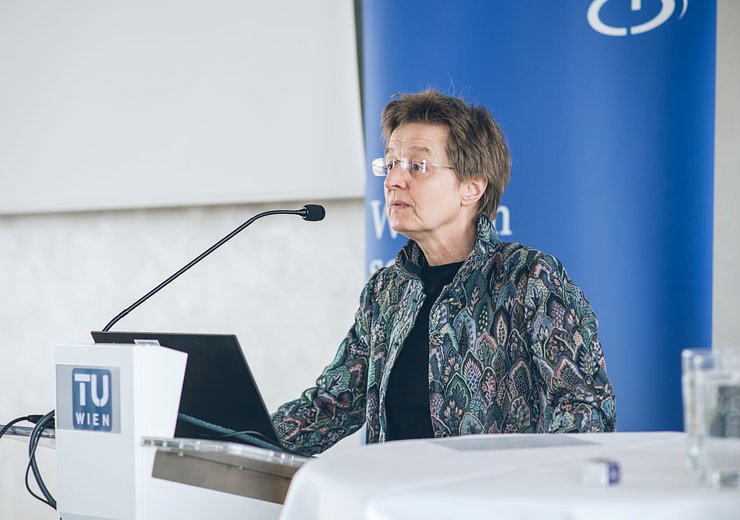Out of the Filter Bubble
The new Christian Doppler Lab for Recommender Systems at TU Wien Informatics investigates how these systems can be made more fair and diverse.

Picture: Amélie Chapalain / TU Wien Informatics
Recommender systems are omnipresent in our everyday lives – from product recommendations in online stores to streaming services’ movie suggestions. We are used to the impressive precision of these systems, offering us tailored recommendations. But it becomes increasingly clear that they also create a “filter bubble”, severely limiting our reception, interaction, and consumption choices. This bias not only affects the virtual world but has very real social and political implications.
The “Christian Doppler Laboratory for Advancing the State-of-the-Art of Recommender Systems in Multi-Domain Settings” will focus on dynamic aspects, fairness, and diversity of Recommender Systems under the direction of Julia Neidhardt. “A good system should be accurate, but it should also offer different suggestions and provide an element of surprise. And it should be fair, which means delivering results of the same quality for all users or user groups,” Julia Neidhardt explains. How the three factors “accuracy”, “diversity” and “fairness” relate to each other is to be investigated by the CD Laboratory’s research group.
The lab is based at the Institute for Information Systems Engineering and cooperates with Falter Verlagsgesellschaft m.b.H. and YKMB Software GmbH. “While research on Recommender Systems is mostly based on data sets collected in the past, the collaboration with companies allows us to observe the smallest changes in the system live and over longer time periods,” Julia Neidhardt describes the advantage of the cooperation. The diversity of the partners is crucial to the success of the Christian Doppler Lab: “While it may be advantageous in the fashion industry to only receive suggestions that match one’s own preferences, this can be problematic in the case of news, because it creates a filter bubble,” explains Neidhardt.
Opening of the Christian Doppler Lab for Recommender Systems
At the opening ceremony on May 3rd, 2022, Ulrike Unterer, Vice President of the Christian Doppler Research Association and Head of the Department for Key Technologies at BMDW congratulated Julia Neidhardt and her team, emphasizing that recruiting a CD Laboratory is no small feat, entailing an elaborate selection process. “We are particularly pleased that a woman is heading a CD Laboratory in IT,” Unterer states, “a field which is unfortunately still dominated by men.”
CD Laboratories at TU Wien
CD Laboratories are significant for third party funding at TU Wien, with 6 million Euros acquired from the Christian Doppler Research Association in the last period. TU Wien is the leading grant holder among Austrian universities, with 44 laboratories established so far. Johannes Fröhlich, Vice Rector for Research and Innovation at TU Wien is pleased that especially young scientists are submitting CD Laboratory applications, attracting valuable cooperation partners for the university and the Christian Doppler Research Association.
Sustainable integration of the research fields addressed in CD Laboratories is essential, says Fröhlich – a minor challenge for Julia Neidhardt, who has researched Recommender Systems since her Ph.D. studies. Moreover, Recommender Systems are an increasingly popular topic among TU Wien Informatics’ students, Julia Neidhardt knows from her own teaching experience, “the demand for courses and number of participants, especially in our Masters degree courses is high.”
Recommender Systems’ societal implications
The technologies used in Recommender Systems have been around since the 1990s, but it is only through the mass use of the internet that they have reached their current significance. Dean of TU Wien Informatics Gerti Kappel emphasizes the importance of Recommender Systems research, since these systems affect everyone in their daily lives: “As one of the leading informatics faculties, we are committed to society. We measure our research progress in terms of benefits to all, developing diverse and fair technologies. Recommender Systems are a vital part of this endeavor.”
The challenges of measuring innovation in terms of societal benefits were further addressed in a short keynote by the former Dean of TU Wien Informatics, Hannes Werthner. Recommender Systems are one of the key technologies derived from monetizing the internet. Personalization is a core function within these systems, requiring and generating a vast amount of sensitive data. Therefore, research, development, and regulation of Recommender Systems alongside democratic values are crucial for users and our society as a whole.
About Christian Doppler Labs
At Christian Doppler Laboratories, application-oriented basic research is conducted at a high level, with outstanding scientists cooperating with innovative companies. The Christian Doppler Research Association is internationally regarded as a best-practice example for the promotion of this cooperation. Christian Doppler Laboratories are jointly funded by the public sector and the participating companies. The most important public funding body is the Austrian Federal Ministry for Digital and Economic Affairs (BMDW).
Read more about Julia Neidhardt and her research on Recommender Systems here (in German.)
Curious about our other news? Subscribe to our news feed, calendar, or newsletter, or follow us on social media.





